Taliban gunshots echo through Khwaga Ghani’s new life at Berkeley
Forced into flight, the Afghan journalist dreams of returning home to tell the stories of her people
November 22, 2021
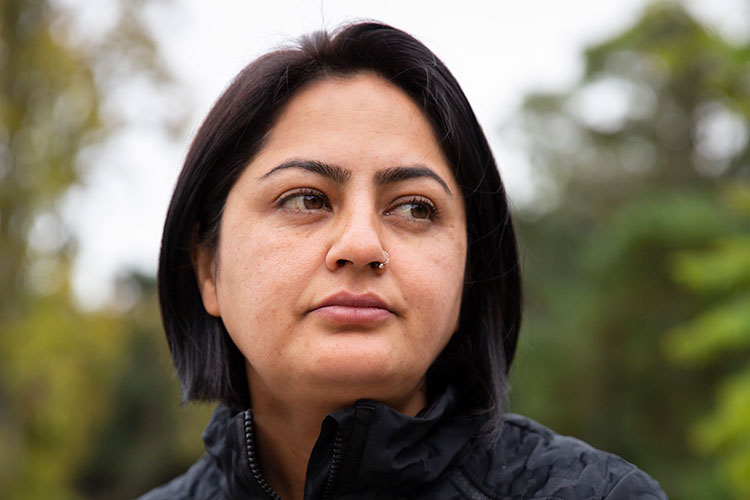
After the fall of Kabul, it took Khwaga Ghani and some members of her family nearly two months to escape Afghanistan and make their way to California. She is the first fellow in an ambitious program, co-sponsored by UC Berkeley, to support Afghan refugees — and she’s already thinking about how she can get back to Kabul to continue her work as a journalist. (Photo by Brittany Hosea-Small)
On a cool autumn morning in the East Bay, a morning of ragged clouds and shifting light, Khwaga Ghani is at a stylish café having a coffee and thinking about the day ahead. Her schedule is packed with business meetings, family meetings, maybe a driving lesson from her aunt. An ordinary day, on the surface, but through it all, playing constantly in her imagination, is the nightmare that brought her to this moment.
The memories are so immediate: an August morning in Kabul. An informal outdoor meeting with colleagues, interrupted by the startling crack of gunshots. People scattering in search of safety. Separated from her colleagues and urgently making her way across the Afghan capital toward her family’s home. Taking rides from perfect strangers, at other times running as fast as her sneakers would carry her, the lone woman among throngs of panicked men fleeing from the Taliban.
Today, Ghani is safe in California, the first fellow in an ambitious program organized by UC Berkeley’s Human Rights Center, San Jose State University’s Human Rights Institute and the UC Berkeley Afghan Student Association to bring threatened Afghan scholars to the Bay Area. She’s already resumed her contacts with colleagues from National Public Radio, the New York Times and Amnesty International.
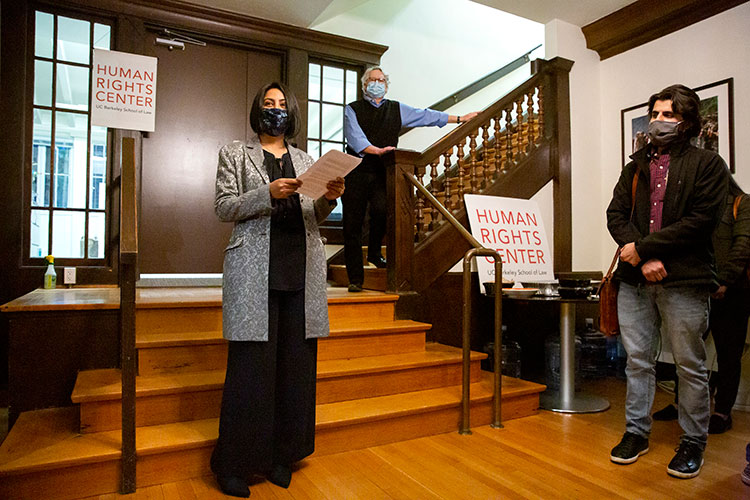
At a small reception, Khwaga Ghani read emotional remarks to an audience at the UC Berkeley Human Rights Center. “My soul had already been wounded and I left it behind me” in Afghanistan, she said. (Photo by Brittany Hosea-Small)
Her English is so good, so natural, and her confidence in conversation so steady, that one could assume she’s been educated in the United States or in Europe, and that she is fully familiar with the culture. But before September 1, 2021, she had never been in the U.S. Though she had some sense of life here from family members who immigrated over the years, so many things are unfamiliar.
On campus recently for a small reception at the Human Rights Center, she tried to describe her complex feelings after the harrowing escape.
“I’m just taking my body to a safe place, because my soul had already been wounded and I left it behind me,” she said. “I left the homeland where I belong, where I was supposed to develop and bring changes for the new generation through my work and my stories.”
An idealist finds her calling in journalism
Like so many Afghans in her generation, Khwaga Ghani’s life has been forged by exile.
After the Soviet Union ended its disastrous occupation of Afghanistan in 1989, the country spiraled into chaos. When civil war broke out in the early 1990s, her family joined a mass exodus to Pakistan.
She was educated there, learned English, worked for a computer company’s call center. The U.S. routed the Taliban after the terror attacks of Sept. 11, 2001, but only after her brother and sister finished their schooling did the full family return to its homeland in 2011.
After a period of adjustment, Ghani found her footing in work. She taught English to students at a vocational school, and then at Bakhtar University. That led to a position with the Afghanistan Independent Human Rights Commission, doing translation and writing press releases. Then there was work with a security company that provided training for Western journalists.
In this way, she entered the world of journalism and journalists.
‘This is what I wanted to show the world’
For a young woman from an idealistic generation, it was a liberation: The chance to report critically important stories that convey the strength and the joy of her country — and the complexities usually absent from international news coverage.
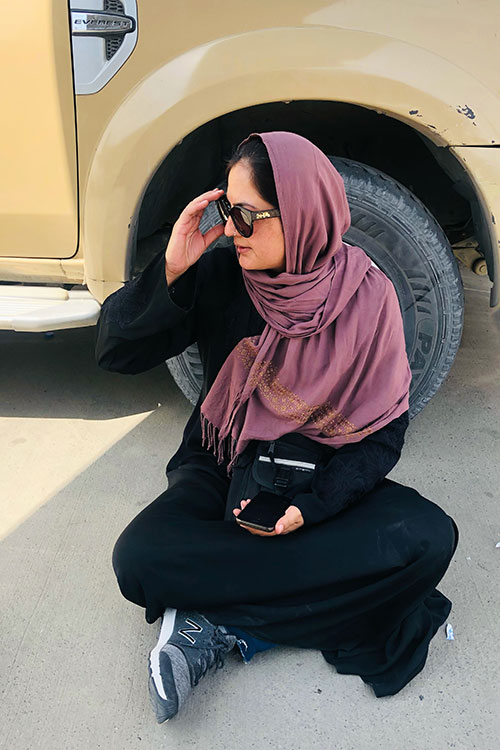
After a tense journey across Kabul, Ghani and others arrived at the former Hamid Kharzai International Airport. There, they waited for days for a flight out of the country. A smartphone was her lifeline to colleagues who were aiding her escape. (Photo by Wagma Ghani)
She worked with Western news agencies, such as Vice News, National Public Radio (NPR) and the New York Times. She roamed the city and the countryside fearlessly, dressed in Western clothes, talking to people — and in a country that was increasingly educated and growing into its freedom, the experience was exhilarating.
She contributed to a film about a women’s mountaineering group, and an article about a women’s soccer team. Another article focused on women in Afghan security forces — and not only were the subjects women, but so were all of the journalists.
“Most work that I have done is on women and girls in Afghanistan,” Ghani explained. “They don’t only sit at home, have children and cook. They can come out and climb a mountain. They can come out and fly a plane.
“Doing all of these stories, I saw changes every year — good changes, a lot of good changes. People’s behavior was different toward women working, toward women going to school, toward women going to the university, toward women trying to do something for the country.
“This is what I wanted to show the world.”
Ghani reported other stories that were more troubling. In May 2020, anti-government militants attacked the maternity ward of a Kabul hospital, leaving 24 people dead. Six months later, militant forces attacked a Kabul university, leaving 19 dead.
But she was certain that 90% of the people were on the side of freedom. The other 10%? If only they could understand the value of education — and that education was in harmony with Islamic values — she hoped that they, too, would come around.
It’s true, she agreed, that U.S. President Donald Trump’s announcement of a U.S. withdrawal in October 2020 had a destabilizing effect, as did new President Joe Biden’s decision to proceed with that plan. And yet, she was confident that Afghanistan would not yield its hard-won freedoms.
Even as a Taliban offensive advanced across much of the country in 2021, Ghani did not feel a sense of threat. She was planning a September vacation in Uzbekistan.
‘All of a sudden we hear gunshots — seven gunshots’
On the morning of Sunday, Aug. 15, Ghani and two colleagues from Amnesty International were in the Shahr-e Naw district of central Kabul. The Amnesty team was staying at a guest house as it worked on a sensitive report, and the three of them were sitting on the lawn there, discussing some upcoming interviews.
Ghani recalled the next moments and hours in cinematic detail.
“All of a sudden, we hear gunshots — seven gunshots,” she said. “Everybody started running toward the safe room (at the guest house). There are girls crying. Guards are coming with their guns, telling us, ‘Get into the safe room! Get into the safe room!’ I’m like, ‘Oh, my God! What’s going on?’”
Quickly a text came from her sister, at work in a different district: “Sister, I heard the Taliban have entered Kabul.”
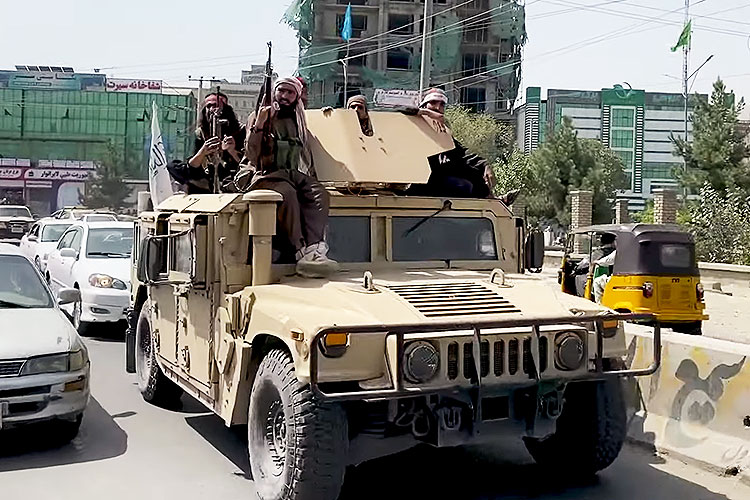
Armed Taliban militia patrolled Kabul in the chaotic days after the fall of Afghanistan’s government. (Photo by VOA News via Wikimedia Commons)
Ghani didn’t believe it, but she sensed her sister’s fear. She texted back: “You go home. I’ll try to come if something’s really the matter.”
The safe room was in a basement, and at first there was no cell phone reception. Ghani and her colleagues were completely uncertain about what was happening and what to do. The Taliban? Probably just a rumor.
Then, somehow, a call from her mother came through. She was upset. “‘Mom,’” Ghani said, “’are you O.K.?’ She’s like, ‘Are you OK?’ I said, ‘Yes, I’m fine — I’m in the safe room.’
“She said, ‘The Taliban have entered Kabul. You need to get home right now!’” Her colleagues were hearing the same news. It was true, then.
The Amnesty workers clearly would be at risk — Ghani urged them to get to the airport immediately. They grabbed their bags and left. She hired a taxi for the 40-minute drive home, but the road was gridlocked. She paid the driver and got out. Everywhere men were streaming from their offices, carrying bags and running. She started running, too.
Over the next few hours, she ran, she walked, she took rides from strangers. Finally, she was reunited with her parents and her sister. “When I got home, everybody got happy, and almost crying,” she recalled. “Like, ‘Thank God you’re back!’”
‘You need to get out right now’
Their relief, however, was short-lived. Given Ghani’s work with Western media, with Amnesty and other organizations, she was at risk of reprisal from the Taliban. Over the next several days, she was in a holding pattern, trying to figure out what to do next. Many Western colleagues were in contact with Ghani via text; they worked to get her placed on official evacuation lists.
On Thursday, Aug. 19, four days after the fall of Kabul, a colleague with Vice News called her from the embattled province of Kandahar. Learning that she was still in Afghanistan, he was worried. He reached out to his contacts and then called her back.
“He told me, ‘O.K., you need to get out right now. Get your stuff — a small bag, just your important things, your documents. That’s it.’”

Hundreds of people gather outside the international airport in Kabul, Afghanistan just after the capital fell to the Taliban. (AP Photo)
That evening, Ghani and some family members were driven to the Kabul Serena Hotel, an unofficial safe zone for journalists and others trying to decamp. On the way, armed Taliban militia stopped them at one checkpoint; at a second, just outside the Serena, they were met by more aggressive soldiers.
While the driver explained and negotiated with the men, Ghani recalled, “I was so scared, I could not even look at them.” Finally, after a fellow journalist vouched for her, the soldiers allowed them to pass.
The Serena was buzzing with journalists, but few of them were working. Everyone was just trying to arrange a way out. Ghani, too, worked her networks, and after four days, she was among 70 others in a van en route to the airport.
The passengers were Afghans who had been working with Westerners, along with their families. The street was gridlocked and thronging with others desperate to escape. A trip of just a few miles took six hours. Some of the passengers prayed. Young children wailed.
They arrived at the airport gate at midnight. Armed Taliban soldiers were patrolling just outside the perimeter; U.S. soldiers were just inside. But if they opened the gate for the van, hundreds of Afghan pedestrians might surge through, too.
The gate did not open. The bus did not move. It was as if nobody, on any side, knew what to do.
From the window of the van, “I see soldiers — Taliban soldiers,” Ghani recalled. “I see they’re special forces, guns in their hands, walking around, scaring people, telling them not to come to the road, go this way, go that way, don’t come through the gates. Gunshots, trying to scare people.”
As they fired into the air, she could see the flash of flame from the muzzles. At another point, the escort who had helped coordinate the trip got off the van to discuss possible solutions with the Taliban soldiers.
“They were so mad that they started beating him up,” she said. The passengers watched in stunned silence.

In the last days before U.S. forces withdrew from Afghanistan, a throng of Afghans hoping to escape waited for evacuation behind a cordon of U.S. Marines at the Hamid Karzai International Airport in Kabul. (U.S. Marine Corps photo by Staff Sgt. Victor Mancilla)
Hours passed, and still the bus did not move. Ghani was frantically texting her colleagues who might know a way to unlock this stalemate. The colleagues responded by reaching out to their contacts in the military, at the U.S. State Department, even at the White House.
At about 3 a.m., she recalled, one of the Taliban soldiers boarded the bus. She was sitting right behind the driver, and she heard the soldier tell him: “‘Don’t try to come close to the gate — if you do, I’m going to shoot everyone in the van. And you will be responsible.’”
The situation was so tense that Ghani could barely breathe. When the soldier was off the bus, she resumed texting her Western co-workers with even greater urgency. The gist of her message: “You guys need to take us out of here, back or forward. Do anything you can, even if we’re not going to go tonight.”
The response? “‘Standby, Khwaga. Standby just a little bit more. Just stand by.’”
Around 4 a.m., in the darkest hour of the morning, the Taliban ordered all 70 passengers off of the van. The soldiers formed a cordon that channeled them toward the airport gate. The gate cracked open, and they walked through.
“American soldiers were standing there,” she said. “They were pulling us in. … And the instant I got in, they were like, ‘Welcome!’”
Ten hours had passed since they’d left the Serena Hotel. Nine days had passed since the fall of Kabul. Now, finally, they were nearly free.
One ordeal ends — and another begins
Khwaga Ghani, her family members, and thousands of other Afghan people at the airport found that just when one ordeal had ended, another began. The days that followed were a blur of hangars jammed with people, administrative disarray, lost luggage. And waiting — and waiting, and waiting.
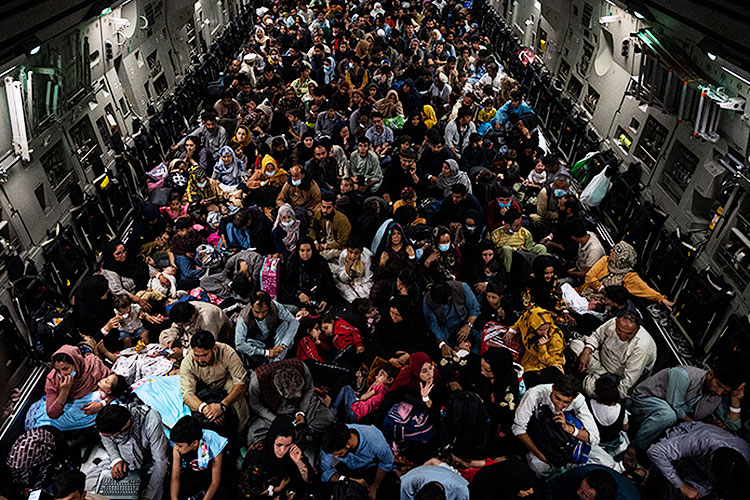
Thousands of Afghans who had worked with Western organizations were evacuated in military transport planes. (U.S. Air Force photo by Staff Sgt. Brandon Cribelar via Wikimedia Commons)
After two-plus days in Kabul, several hundred of them were loaded into the belly of a massive military cargo plane where they sat on the floor without seats or seat belts. Then they were flown to Qatar, where they were held inside the plane for seven hours as it baked in the desert sun. The air inside grew so hot and stale that children and elderly people fainted.
Next came a flight to the U.S. Ramstein Air Base in Germany and four cold nights in a tent. Then, at last, the evacuees arrived Washington, D.C.
There, Ghani noticed that one of the State Department workers had placed her passport and documents in a bright yellow envelope marked: Deportation. For two days, she lived with the fear that she and her family would be sent back to Afghanistan. But then, without explanation, they were cleared for a flight to Fort McCoy, a U.S. Army base in Wisconsin.
They waited there for weeks, as summer turned to fall. In more than a month since they had left Kabul, they had never known where they were going, never had much say in what was happening to them. Their futures were being determined in a military, diplomatic and government processes they couldn’t see, and by people they didn’t know.
‘I want to go back — and I will go back’
Through all of these weeks, as she travelled and worried, a future had been taking shape.
Back in August, just after the fall of Kabul, the U.S.-based Scholars at Risk organization had contacted Berkeley’s Chancellor Carol Christ to ask if the campus could host some Afghan people who needed a new home. With support from Christ and Berkeley Law, the Human Rights Center worked with the Afghan Students Association, counterparts at San Jose State and other partners to create a program and to raise funds.
Amnesty International conferred with center staff and told them about an Afghan journalist who had an extended family network in the Bay Area and needed a place to recover, and to resume her work. It seemed like a good fit.

During a reception at the UC Berkeley Human Rights Center, members of Khwaga Ghani’s extended family celebrated her safe arrival in the Bay Area. One young relative gave her a bouquet and embraced her. (Photo by Brittany Hosea-Small)
“It’s important for the university to support Khwaga and other Afghan scholars because of the extreme risks they are facing, as well as the tremendous value they have for the world in terms of their knowledge and abilities,” said Alexa Koenig, the center’s executive director. “Our academic community will be so much richer thanks to their presence, whether in law, journalism, computer science or other fields.”
Koenig said the program expects to support 10 Afghan scholars — six at Berkeley and four at San Jose State, as well as their family members. With one-year fellowships, the scholars will have an academic base so they can continue their work, plus financial support for travel and housing, and legal help to navigate the complicated landscape of visas and work permits.
Ghani was the first of the fellows to arrive in California, and on Oct. 8, some 30 members of her extended family welcomed her at the airport. On a rainy evening a few weeks later, most of them were on campus for the reception organized by the Human Rights Center, mingling with Koenig, Law School Dean Erwin Chemerinsky and other faculty and staff from the Human Rights Center.
In remarks prepared for the occasion, Ghani was eloquent and gracious, but she did not try to hide the reality: She is struggling to comprehend how her life could change so suddenly and so profoundly.
But for now, she needs to find a place to live. She must learn to drive and take mass transit. Her luggage is still lost, and she still doesn’t have a work permit. Her work will be her salvation and the one certainty in the weeks ahead. At Berkeley, she will sit in on journalism classes, and she’s already planning projects with NPR and Amnesty International.
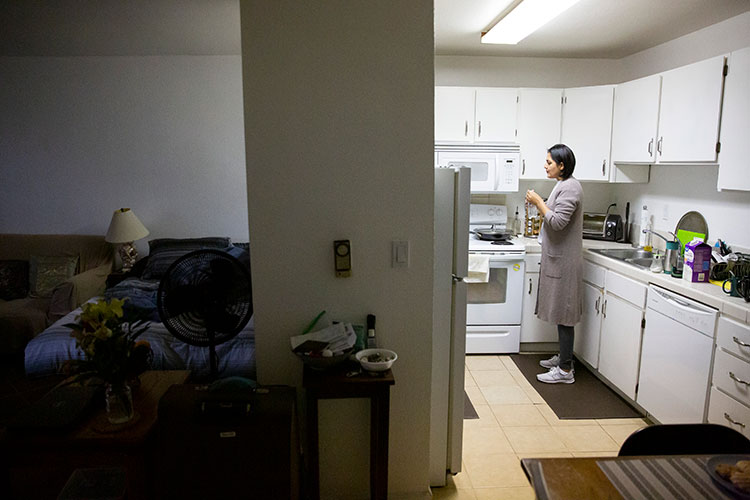
When Khwaga Ghani and other members of her family arrived in the Bay Area after an arduous journey, they stayed in a small East Bay apartment with her brother and his spouse. (Photo by Brittany Hosea-Small)
Talking that November morning at the café, Ghani said that even in the midst of so much change and loss, she has a vision for her future.
“When I came out (of Afghanistan),” she said, “I didn’t care if I will die serving my country and telling the truth. But I was scared that even if I’m going to live here, even if I’m not going to die, I’m going to lose this way of serving my country.
“I want to be able to tell stories about my people, about my country, about my culture, about the values we have. I have this in my mind: I need to learn more. I need to be more educated, to get back to my country and serve in a better way.”
Even now, given all that has changed at home?
“Yes,” she said, emphatically. “Yes. I want to be able to go report. I want to go back, and I will go back.”